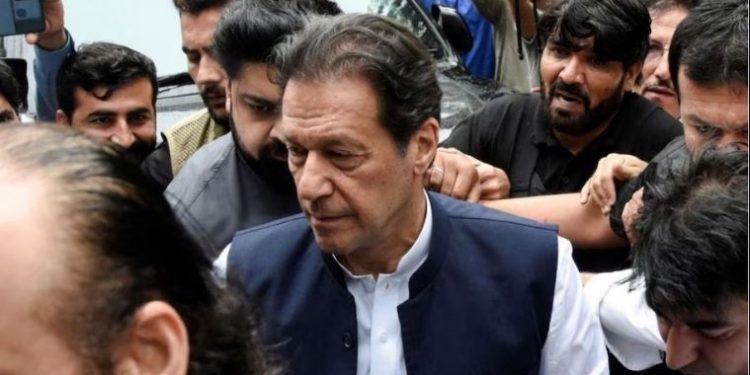Islamabad: The Islamabad High Court Wednesday ruled that jailed former Pakistan prime minister Imran Khan’s bail plea in the cipher case would take place in an open court October 9, as it disposed of a petition by the country’s top investigation agency seeking in-camera proceedings of the bail plea.
Khan, 70, was arrested in August after the case was filed against him for allegedly violating the Official Secrets Act by disclosing a secret diplomatic cable (cipher) sent by the country’s embassy in Washington last year in March.
Last week, the Federal Investigation Agency (FIA) filed a petition in the Islamabad High Court (IHC) seeking in-camera proceedings of Khan’s bail plea. It said an open hearing in a case related to the alleged disclosure of state secrets could pose a “risk of deteriorating relations” with other countries. Khan and his close aide Shah Mahmood Qureshi were named “principal accused” in the case by the apex investigation agency.
Both Khan and Qureshi are currently detained in jail on judicial remand.
September 26, both leaders’ judicial remand was extended until October 10 as Khan as per the IHC’s orders was shifted to Rawalpindi’s Adiala jail from Attock district jail.
Wednesday, the Islamabad High Court (IHC) ruled that an open court hearing on the bail petition will be held October 9.
The court, however, stated that “sensitive information” regarding the case would be in-camera, as it disposed of the FIA plea seeking in-camera proceedings.
Special Court Judge Abual Hasnat Zulqarnain presided over the hearing at Adiala jail, where Pakistan Tehreek-e-Insaf (PTI) party chairman Khan and Vice Chairman Qureshi are currently incarcerated.
The court had reserved earlier this week its judgment on the FIA plea for in-camera proceedings in the bail plea by Khan.
Meanwhile, PTI lawyer Barrister Salman Safdar termed the in-camera trial of the Khan and former foreign minister Qureshi in the cipher case “unconstitutional”.
“The trial should not be held behind closed doors. It is unconstitutional,” Safdar said outside the jail.
“Imran’s arrest and remand in the case were also kept secret, and now, this trial is being kept secret as well,” he was quoted as saying by the Dawn newspaper.
Khan is charged with violating the Official Secrets Act in connection with the leakage of a confidential diplomatic cable from Pakistan’s embassy in Washington.
In March last year, ahead of the vote of no-confidence that resulted in his ouster, cricketer-turned-politician pulled out a piece of paper – allegedly the cipher – from his pocket and waved it at a public rally in Islamabad, claiming it was the evidence of an “international conspiracy” being hatched to topple his government.
However, during the interrogation with the joint investigation team (JIT) in the jail August 26, Khan denied that the paper he waved at a public gathering last year was the cipher. He also admitted to losing the cipher, saying he couldn’t recall where he kept it.
His principal secretary, Azam Khan, stated before a magistrate and the FIA that the Khan used it for his ‘political gains’ and to avert a no-confidence vote against him.
The purported cipher (secret diplomatic cable) contained an account of a meeting between US State Department officials, including Assistant Secretary of State for the Bureau of South and Central Asian Affairs Donald Lu, and Pakistani envoy Asad Majeed Khan last year.
PTI






































